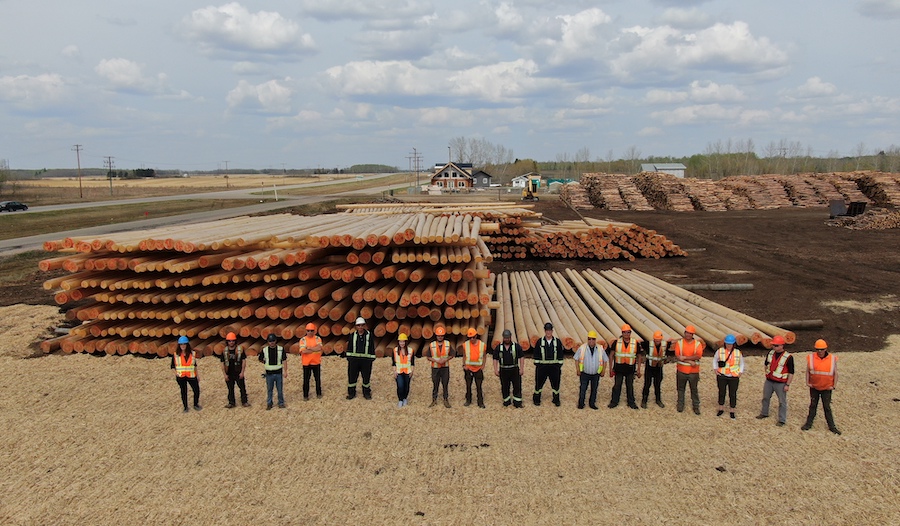
Industry News
News
Remanufacturing
Federal decision threatens Indigenous family-owned wood treatment facility
September 19, 2023 By Wood Preservation Canada
 Vermette Wood Preservers is a second- and third-generation facility, and the only Indigenous family-owned business in Canada in the pressure treated wood industry. Photo supplied.
Vermette Wood Preservers is a second- and third-generation facility, and the only Indigenous family-owned business in Canada in the pressure treated wood industry. Photo supplied. This year marks the 50th anniversary for Vermette Wood Preservers (VWP), an Indigenous family-owned and operated wood treatment facility located in Spruce Home, Sask. When brothers Archie and Gil Vermette went into business in 1973, their goal was to make a better life for their families. Their parents instilled these family values in them, along with the Métis entrepreneurial spirit of hard work and determination. What should be a celebrated anniversary for owner Perry Vermette and the VWP team has taken a turn, as a Health Canada regulatory decision threatens the closure of his facility, and the livelihoods of up to 30 families employed by VWP.
Vermette Wood Preservers uses an oil-borne preservative called Pentachlorophenol (Penta) to treat products such as wood utility poles and cross arms. On Oct. 4, 2022, the Pest Management Regulatory Agency (PMRA), an agency of Health Canada, announced that they would be banning the use of Penta within one year. While the industry has been preparing for the eventual phase-out of Penta, this short timeline combined with the lack of approved alternatives, has serious implications for the delivery of electricity and telecommunication services, and the livelihood of families working at VWP.
Warren Steinley, Member of Parliament for Regina-Lewvan, shared his concerns, “Small business and families are facing uncertainty because of this government’s painfully slow approvals of science-based applications within Health Canada’s PMRA. This government is out-of-touch and is leaving Canadians, like the Vermette family, in the dark. I am urging this government to reach out to industry experts and approve an alternative to Pentachlorophenol as soon as possible so these businesses can have the certainty they need to be successful now and well into the future.”
This is further compounded by the fact that, to date, Health Canada has not approved oil-borne alternatives to Penta as a wood preservative. This means that utilities and telecommunications in Saskatchewan will be faced with a major supply gap. Douglas Fir is a wood species largely used for this application and it requires an oil-borne pesticide. Reductions in pole availability will increase the cost of utility poles, which will be felt directly by ratepayers and business-owners throughout the province. In the USA, these oil-borne alternatives have been approved and in-use for over five years. Why the lag in Canada?
The immediate concern is the ability to rebuild following a natural disaster – in the case of an extreme weather event, utilities will be left without access to a reliable supply of utility poles to restore power and telecommunication services in impacted areas. Any disruption to service could also threaten access to emergency services for impacted Saskatchewanians.
“The October 4th deadline does not mean that this becomes a problem in the fall,” explains Perry Vermette. “This is and has been a problem for several months and I’m gravely concerned for the welfare of my employees, their families, and the public safety of everyone in Saskatchewan.”
This decision will also have a negative impact on existing electricity infrastructure in Saskatchewan, as well as projects for broadband expansion, grid hardening and electrification projects such as augmented use of electric vehicles.
Over the past two years, VWP and Wood Preservation Canada have appealed to the PMRA and the federal government to consider the wide-spread impact of this decision on the province of Saskatchewan; but to date, there has been no movement towards a realistic solution. After hearing the industry’s concerns, the registrant for Penta wrote to the PMRA requesting a longer phase-out period for Penta. The request was quickly dismissed by the PMRA.
“PMRA is not grasping the urgency of this situation,” says Natalie Tarini, executive director for Wood Preservation Canada. “We are talking about jobs, natural disaster relief efforts, electrical infrastructure maintenance and expansion – the ripple effect of not having approved alternatives will be felt across Saskatchewan, impacting businesses and ratepayers.”
Perry Vermette hopes to shine a light on this issue. “At Vermette Wood Preservers, we’re not just a team, we are a family,” said Vermette. “I’m asking PMRA to work with us to ensure that the torch gets passed to the next generation and the Indigenous lineage at VWP can continue for another 50 years.”
Vermette Wood Preservers is a second- and third-generation facility, and the only Indigenous family-owned business in Canada in the pressure treated wood industry. VWP produces wood products for customers throughout North America, with SaskPower as one of their largest customers. Perry operates the facility with help from his son-in-law Samuel Hadden (general manager), son Kyle Vermette (production manager) and grandson Rhome, who is a manager-in-training. VWP currently employs nearly 30 people as well as numerous people indirectly through companies contracted for harvesting. VWP is also an important employer in Saskatchewan and active member of the community in which it operates.
Print this page